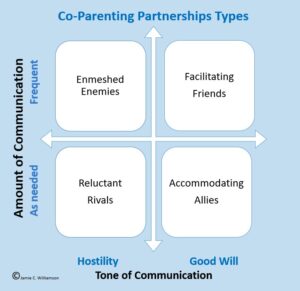A New Way to Discover the Best Co-Parenting Partnership Type
By Jamie C. Williamson, PhD
 Divorce should not be entered into lightly, especially if you are a parent. Marriages may dissolve. But co-parenting is truly a “to death do us part” commitment. Parents must choose (and it is a choice) whether they will have a friendly divorce or an acrimonious one. The decision has a lasting impact on the parents, and especially their children.
Divorce should not be entered into lightly, especially if you are a parent. Marriages may dissolve. But co-parenting is truly a “to death do us part” commitment. Parents must choose (and it is a choice) whether they will have a friendly divorce or an acrimonious one. The decision has a lasting impact on the parents, and especially their children.
This obvious reality may come as a shock to even the best parents who are wrapped up in the early stages of divorce. Parents contemplating divorce or dealing with the emotional, psychological, and financial aspects of divorce often require a reminder that children need a safe, secure, and happy family environment to become well-adjusted emotionally and psychologically. Children need their parents to be partners, to like each other, and to be friends at best or, at least, to co-exist peacefully. And children need this, whether their parents stay married or not.
Fortunately, co-parents are not hostages to their old emotions or patterns of interaction that lead to their divorce. They can build an entirely new relationship based on their mutual love for their children and their interest in building a stable future for the kids and for themselves. To do so, they must agree to be both physically and emotionally divorced so they can focus on the future, not the past. 
I call this approach a “friendly divorce”. The families of these friendly divorces continue to be just that — families”.
As a social psychologist specializing in relationship communication counseling and working as a family mediator, I encourage separated or divorced co-parenting couples to assess their Co-Parenting Partnership Type by focusing on the expected frequency of their contact and tone of their interaction, both with one another and in front of their children.
Of course, the ideal co-parenting partnership is characterized by Good Will, balanced by the appropriate Amount of Communication given the age of the children.
Co-parents can answer the following questions to discover the best co-parenting partnership type for their post-divorce parenting relationship.
- Given the age of your children, how often will the two of you need to communicate to coordinate shared parenting now, and as your children grow older? How willing are you to let hostile communication with each other impact your children’s development and detract from your ability to build a stable and happy future for yourself?
- Considering the holidays, extended-family events, your children’s birthdays, school and extracurricular activities, how often will you both be in the same public place at the same time now and as your children come of age? How willing are you to let the distress associated with seeing one another detract from your and especially your children’s ability to enjoy school and extracurricular activities?
- As married parents, how often did you show negative feelings toward each other in front of your children? How did you feel about it on those occasions that you did show negative feelings toward each other in front of your children? How did your children react?
- Did you try to refrain from displaying hostility with each other in front of the children because you were married or because you didn’t want to upset your children? Why would your motivation change now that you are separating?
- On the Co-Parenting Partnership Types diagram, which type of divorced parenting would characterize your current co-parenting relationship?
- Which type of divorced parenting partnership do you believe will support the physical, social, intellectual, and spiritual well-being of your children?
- What do you have to change about the frequency and tone of your interaction to become that type of divorced parenting team? How might your co-parenting style naturally change as your children come of age?
If you are thinking about separating or are already divorced, talk through these questions seriously with your parenting partner. Decide together which Co-Parenting Partnership Type supports your children’s social, emotional, and intellectual well-being, and focus on their needs, rather than your own hurt, anger, or regret. Then, “work it out”.
And, let me know if I can help.
You’ll find me at Amity Mediation Workshop, where we facilitate Divorce, Family, and Civil Meditations. We also conduct co-parenting psycho-educational sessions that provide divorced co-parents with a tool kit for handling conflict and a safe place to learn new ways to communicate with each other. We help co-parents discover the Co-Parenting Partnership Type that is right for their circumstances and set them on a path toward building a stable future, rather than be stuck rehashing the past.
